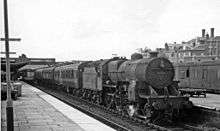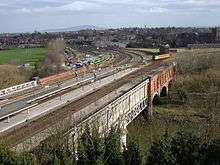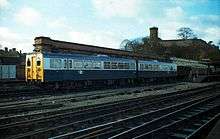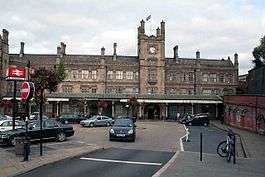Shrewsbury railway station
| Shrewsbury | |
|---|---|
|
Shrewsbury | |
| Location | |
| Place | Shrewsbury |
| Local authority | Shropshire Council |
| Grid reference | SJ494129 |
| Operations | |
| Station code | SHR |
| Managed by | Arriva Trains Wales |
| Number of platforms | 5 (numbered 3-7) |
| DfT category | C1 |
|
Live arrivals/departures, station information and onward connections from National Rail Enquiries | |
| Annual rail passenger usage* | |
| 2004/05 | 1.295 million |
| 2005/06 |
|
| 2006/07 |
|
| 2007/08 |
|
| 2008/09 |
|
| 2009/10 |
|
| 2010/11 |
|
| 2011/12 |
|
| 2012/13 |
|
| 2013/14 |
|
| 2014/15 |
|
| History | |
| 1848 | Opened |
| National Rail – UK railway stations | |
| * Annual estimated passenger usage based on sales of tickets in stated financial year(s) which end or originate at Shrewsbury from Office of Rail and Road statistics. Methodology may vary year on year. | |
|
| |


Shrewsbury railway station is in Shrewsbury, Shropshire, England. Built in 1848, it was designated a grade II listed building in 1969.
The station is 43 miles (69 km) north west of Birmingham New Street. Many services starting at or passing through the station are bound for Wales; it is operated by Arriva Trains Wales and is one of their key network hubs.
Shrewsbury was the busiest station in Shropshire and 14th busiest in the West Midlands in 2014-15.[1]
History
The station was formerly known as Shrewsbury General and is the only remaining railway station in the town; Shrewsbury Abbey, as well as other small stations around the town, having long closed.
Shrewsbury railway station was originally built in October 1848 for the county's first railway — the Shrewsbury to Chester Line. The architect was Thomas Mainwaring Penson of Oswestry.[2] The building is unusual, in that the station was extended between 1899 and 1903 by the construction of a new floor underneath the original station building.[2] The building style was imitation Tudor, complete with carvings of Tudor style heads around the window frames. This was done to match the Tudor building of Shrewsbury School (now Shrewsbury Library) almost directly opposite. The station's platforms also extend over the River Severn. It was operated jointly by the Great Western Railway (GWR) and the London and North Western Railway (LNWR).[3]
At Shrewsbury in steam days, the GWR regularly turned its locomotives by running round the triangle formed by using the Abbey Foregate loop, which links the Wolverhampton Line with the Welsh Marches Line and enables through running for freight trains, summer Saturday specials and formerly for trains like the Cambrian Coast Express. Until 1967 Shrewsbury was served by the GWR, latterly BR Western Region, express services between London Paddington and Birkenhead Woodside railway station.
The station was given Grade II listed status in May 1969;[2] this applies to the main building on Castle Foregate, adjacent to platform 3.
Opposite platform 7 is a large concrete wall that divides the rest of the station from what could be considered to be platform 8. This platform does not see any use and was built for the use of transporting prisoners from the local prison in The Dana. (The prison gateway, surmounted by bust of prison reformer John Howard, is visible from platform 7.) It is believed that this platform was only used on several times a year between 1868 up until just before the First World War.
War Memorials
On Platform Three is a metal plaque listing (with their respective stations of employment) 42 employees of the London and North Western and Great Western Joint Railways who died serving in the armed forces in 'the Great War', with figures of a soldier and sailor and representations of a cannon and steamship. It was restored and rededicated in 2010. Inside the Railtrack offices is a decorative metal plaque to 14 "heroes" of the LNWR's Locomotive Department in Shrewsbury who died serving in World War I, placed there in December 1920. Also preserved is a framed Roll of Honour listing employees of the GWR nationally who also died in the war.[4]
Accidents and incidents
- On 15 October 1907, a mail train hauled by Experiment class locomotive No. 2052 Stephenson was derailed at Shrewsbury due to excessive speed on a curve. Eighteen people were killed.[5]
- Arwel Hughes composed Tydi a roddaist in 20 minutes during a wait between train connections in 1938. A plaque to mark this was unveiled on Platform Three in 2004.[6]
Platforms and facilities
| Shrewsbury | |||||||||||||||||||||||||||||||||||||||||||||||||||||||||||||||||||||||||||||||||||||||||||||||||||
|---|---|---|---|---|---|---|---|---|---|---|---|---|---|---|---|---|---|---|---|---|---|---|---|---|---|---|---|---|---|---|---|---|---|---|---|---|---|---|---|---|---|---|---|---|---|---|---|---|---|---|---|---|---|---|---|---|---|---|---|---|---|---|---|---|---|---|---|---|---|---|---|---|---|---|---|---|---|---|---|---|---|---|---|---|---|---|---|---|---|---|---|---|---|---|---|---|---|---|---|
Legend | |||||||||||||||||||||||||||||||||||||||||||||||||||||||||||||||||||||||||||||||||||||||||||||||||||
| |||||||||||||||||||||||||||||||||||||||||||||||||||||||||||||||||||||||||||||||||||||||||||||||||||
There are five platforms in use, numbered 3 to 7 (platforms 1 and 2 have been disused since the 1970s and have no track). Of these, platforms 4, 5, 6 and 7 are grouped on a main island, while platforms 1, 2 and 3 are separate, located by the main station building. The platforms are numbered in order from west (Shrewsbury Castle side) to east (The Dana side) from 1 to 7.
Platform 3 was until recently only used by trains running in from the Wolverhampton direction and out towards Chester. Changes recently made to the signalling and track now allow additional passenger trains (those coming in from and going out to the Hereford, Heart of Wales and Cambrian lines) to use platform 3. A passenger lift was opened on the platform in 2009 and a waiting room opened shortly after.
Platforms 4 and 7 are through platforms, usually used for trains between Holyhead (via Chester and Wrexham General) and Cardiff Central/Birmingham International and between Manchester Piccadilly (via Crewe) and Cardiff Central, Carmarthen, and Milford Haven. Platforms 5 and 6 are bay platforms, used mainly for trains to and from Aberystwyth and Birmingham, as well as trains for the Heart of Wales Line.
The island platforms are connected to the main station building and platform 3 by a pedestrian subway running underneath the station. A pedestrian footbridge over the platforms still exists but has long been disconnected from the station; instead, it is a public walkway allowing pedestrians to cross over the station area, and part of a route named "The Dana".
Services
Railway lines in Shrewsbury | |||||||||||||||||||||||||||||||||||||||||||||||||||||||||
|---|---|---|---|---|---|---|---|---|---|---|---|---|---|---|---|---|---|---|---|---|---|---|---|---|---|---|---|---|---|---|---|---|---|---|---|---|---|---|---|---|---|---|---|---|---|---|---|---|---|---|---|---|---|---|---|---|---|
Legend
| |||||||||||||||||||||||||||||||||||||||||||||||||||||||||
Arriva Trains Wales
- Alternate hourly service from Holyhead via Chester and Wrexham General to Birmingham International or Cardiff Central.[7]
- Two-hourly services from Aberystwyth and Pwllheli via the Cambrian Line to Birmingham International which merge at Machynlleth.[8] Some additional Aberystwyth trains start & finish here at certain times of day.
- Hourly services from Manchester Piccadilly to Cardiff Central via the Welsh Marches Line. Most services on this route extend to Carmarthen and through to Milford Haven every two hours. There is also a two-hourly local stopping service to Crewe on this route.[9]
- Services via the Heart of Wales Line to Swansea. Four trains per day each way Monday–Saturday (plus one early morning service to Llandrindod Wells except Saturdays) and two trains each way on Sundays.[10] Two of these each way run to and from Crewe on weekdays.
- Locomotive-hauled "Premier" service between Holyhead and Cardiff Central via Chester. One train each way per day.
- Local Stopping services to Wrexham General
- On a Sunday, Arriva Trains Wales operate stopping services from Shrewsbury and Wolverhampton in lieu af the fact that London Midland only operate Shrewsbury to Birmingham New Street services from Mondays to Saturdays.
All of the services above are operated by Class 150s, Class 153s, Class 158s or Class 175s, except the "Premier" service which is operated by a Class 67 and Mark 3 coaching stock.
London Midland
- Hourly stopping service to Birmingham New Street, operated by a Class 170, from Monday to Saturday.[11]
- One train per day to Rugeley Trent Valley with no return journey.
Virgin Trains
- Two daily services (one on Sundays) to and from London Euston, operated by Class 221s.[12][13]
Signalling
Severn Bridge Junction signal box, at the south end of the station and built by the LNWR, is the largest surviving mechanical signal box in the World, with a frame accommodating 180 levers, and is a listed building. Whilst the line beyond Abbey Foregate signal box to Wolverhampton has been updated to electronic signalling, Shrewsbury itself is set to remain lever operated for the foreseeable future.[14] As a result of Shrewsbury's joint (GWR/LNWR) history, and having been transferred at different times between the Western and London Midland regions of BR and more recently Network Rail - it is now in the Great Western territory again - the signalling is a diverse mixture of lower-quadrant and upper-quadrant semaphore signals, with a few colour lights too. Crewe Junction, on the north end of the station, accommodates around 120 levers and is of the same design as Severn Bridge Junction.
The other Shrewsbury signal boxes are at Abbey Foregate (to a GWR design), controlling the eastern corner of the triangle, Sutton Bridge Junction where the Aberystwyth line diverges from the Hereford line, Crewe Bank (was to have been closed in April 2009,[15] but now due to close in 2012) just beyond the station towards Crewe, and Harlescott Crossing, slightly further on towards Crewe.
In Autumn 2010 changes were made to allow Cambrian and Welsh Marches line trains to depart in a southerly direction from Platform 3 — an upper quadrant signal replaced the previous shunting disc and a facing point lock was added to the points. Though the track layout could already accommodate this, until the lock was added only non-passenger movements southbound from Platform 3 could be made.[16]
Station usage
According to the Office of Rail Regulation statistics for the 2011/12 financial year, the total number of entries and exits at the station was 1,730,390 (based on tickets sold at Shrewsbury, and tickets sold to Shrewsbury); with an estimated 205,148 passengers interchanging between services. This makes Shrewsbury the 14th busiest in the West Midlands region and the 6th busiest on the Arriva Trains Wales network.[17]
Future development
In 2013 Arriva Trains Wales proposed to redevelop part of the station's facilities between platforms 4 and 7, involving the waiting room and customer information office located at the top of the main stairs.[18]
Virgin Trains was granted permission from ORR (Office of Rail Regulation) and Network Rail to run a twice-daily direct service to London Euston, which it hoped would be running by May 2014.[19] This was scrapped by Virgin in January 2014, because the times given were "not economically viable".[20] Since then Virgin have re-applied for the two daily return services to London Euston, which started at the December 2014 timetable change.[21][22]
New stations
It has been proposed that Shrewsbury should have a Parkway railway station built on the Wolverhampton to Shrewsbury Line, east of the town in the Preston Boats/Emstrey area, adjacent to the A5 road. This new station would be co-located with a fourth bus-based Park & Ride site for the town[23] to simultaneously serve shoppers and commuters heading both to and from Telford and the West Midlands conurbation. Reasons cited for this project include the poor provision of car parking at Shrewsbury's current only railway station and the lack of a park and ride site to serve visitors to the town from the east, who presently need to use Meole Brace in the south or Harlescott in the north of the town.
As well as the poor provision of car parking previously mentioned, the town's geographic location in a tight meander of the River Severn, combined with the one-way systems for motor traffic in the town (particularly the need to go under the low and congested Cross Street arch bridge), make the station difficult and time-consuming to reach by car from many parts of the town. Indeed, from many locations in southern Shrewsbury, e.g. Shrewsbury Business Park, Shrewsbury College on London Road and the Sutton Farm area, it often actually takes less time to drive to Telford Central railway station, along the fast A5 and M54, than to Shrewsbury station.
Further proposed station locations are at Harlescott in the north of the town and Meole Brace in the south.
Images
-

Station building's tower
-

Platforms 3 & 4
-

Railway lines leading east and south of Shrewsbury
-

Looking along platform 4 at the station
-

Severn Bridge Junction signal box. The church in the distance is Shrewsbury Abbey.
-

The station's main frontage, here viewed from The Dana walk by Shrewsbury Castle, is remarkable for its architecture.
-

Detail of the carvings on the railway station. Each window has different carved heads.
-

The station from ground level, offering a better view of the range of carvings.
-

A British Rail Class 140, the prototype of the Pacer in Platform 2 (now closed with the track removed).
-
.jpg)
The direct InterCity from Shrewsbury to London Euston with a DVT and mailbags delivering the Royal Mail at a time when British Rail ran the network.
See also
References
- ↑ Office for Rail Regulation Estimates of station usage
- 1 2 3 "HER no. 10126 - Shrewsbury Railway Station, Castle Foregate, Shrewsbury". Heritage Gateway. English Heritage. Retrieved 13 March 2010.
A railway station built in 1849, and extended circa 1900, which is protected by Grade II Listing. The station became very congested in the later 19th century and was extensively rebuilt between 1899 and 1903 to cope with increased traffic. The bridge was widened, and the platforms extended onto it, and a basement story added.
- ↑ Denton, John Horsley (1986). Shrewsbury Railway Station: a brief history. Welshpool: J.H. Denton & T. Smith.
- ↑ Francis, Peter (2013). Shropshire War Memorials, Sites of Remembrance. YouCaxton Publications. pp. 194–195. ISBN 978-1-909644-11-3.
- ↑ Trevena, Arthur (1980). Trains in Trouble. Vol. 1. Redruth: Atlantic Books. p. 24. ISBN 0-906899-01-X.
- ↑ Shropshire War Memorials, Sites of Remembrance. p. 194.
- ↑ GB eNRT May 2016 Edition, Tables 75 & 131
- ↑ GB eNRT May 2016 Edition, Table 76
- ↑ GB eNRT May 2016 Edition, Table 131
- ↑ GB eNRT May 2016 Edition, Table 129
- ↑ GB eNRT May 2016 Edition, Table 74
- ↑ BBC News, http://www.bbc.co.uk/news/uk-england-29313965
- ↑ GB eNRT May 2016 Edition, Table 65
- ↑ "Signal boxes removed and updated". BBC News. 1 October 2006.
- ↑ "ncg12007west409v1 crewe bank - closure of signal box" (PDF). Network Rail.
- ↑ Adrian the Rock - Signals at Severn Bridge Junction
- ↑ "Estimates of station usage" (XLS). Rail statistics. Office of Rail Regulation. Retrieved 2013-04-05.
- ↑ Shropshire Star 28 March 2013
- ↑ "Direct Shrewsbury-to-London train services to restart". BBC News Shropshire. 14 November 2013.
- ↑ "Anger as Virgin Trains axes Shrewsbury-London service plans". BBC News Shropshire. 17 January 2014.
- ↑ Direct rail services from Shropshire to London will start on December 14Shropshire Star news article 22 September 2014; Retrieved 21 December 2015
- ↑ GB eNRT 2014-15 Edition, Tables 65 & 66
- ↑ Shrewsbury Place Plan 2011-2012
External links
| Wikimedia Commons has media related to Shrewsbury railway station. |
- Train times and station information for Shrewsbury railway station from National Rail
- Signalling around Shrewsbury station
- Shrewsbury station on navigable 1946 O.S. map
- Grade II listing entry
| Preceding station | |
Following station | ||
|---|---|---|---|---|
| Terminus | Arriva Trains Wales Shrewsbury to Wrexham General Line |
Gobowen | ||
| Church Stretton | Arriva Trains Wales Welsh Marches Line |
Yorton | ||
| Arriva Trains Wales South-North Wales |
Gobowen | |||
| Arriva Trains Wales Heart of Wales Line |
Terminus | |||
| Newport | Arriva Trains Wales North-South "Premier" service |
Wrexham General | ||
| Wellington | Arriva Trains Wales Cambrian Line |
Welshpool or Terminus | ||
| Arriva Trains Wales Chester to Birmingham |
Gobowen | |||
| Wellington | London Midland Wolverhampton/Birmingham-Shrewsbury Mondays-Saturdays only |
Terminus | ||
| Wellington | Virgin Trains London Euston-Shrewsbury |
Terminus | ||
| Historical railways | ||||
| Terminus | Great Western Railway Shrewsbury to Chester Line |
Leaton Line open, station closed | ||
| Terminus | Great Western Railway Severn Valley Railway |
Berrington | ||
| Terminus | Shrewsbury and Welshpool Railway | Hanwood Line open, station closed | ||
Coordinates: 52°42′43″N 2°45′00″W / 52.712°N 2.75°W
